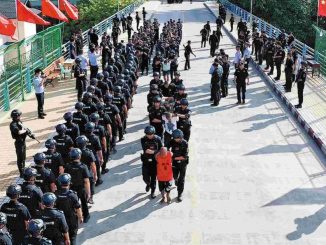
In this file photo, banners hang from Sitong Bridge in Beijing on Oct. 13, 2022. Dissident Peng Lifa unfurled the banners to protest against China’s draconian “zero-COVID” policy and call for an end to the authoritarian regime. Screenshot of Fangshimin’s Twitter account via The Epoch Times
| Published April 27, 2025
That Chinese authorities are alarmed by a rare public protest in Chengdu, where three large banners denouncing the Chinese Communist Party (CCP) were displayed on an overpass for nearly three hours before being removed. The banners, unfurled on April 15 near the Chadianzi Bus Terminal, carried messages calling for democratic reform, such as “Without political system reform, there will be no national rejuvenation” and “China does not need anyone to point out the direction, democracy is the direction.”
According to Chinese dissident Yuan Hongbing, who cited an insider, the CCP’s concern stems not from the content of the banners but from the delayed response by the police, which may indicate potential disloyalty within the security system. The banners went unnoticed for nearly two hours until discovered by a patrol officer, and even then, superiors instructed the officer to preserve the scene as evidence, allowing the banners to remain for an additional 30 to 40 minutes. This incident has raised fears among top leaders about the emergence of “two-faced” individuals within the social-control system, suggesting cracks in the CCP’s tightly controlled surveillance state.
The protester, who reportedly spent a year preparing the banners, has been missing since the morning of April 15. Photos of the banners briefly circulated on Chinese social media before being swiftly censored, but were preserved by overseas accounts, garnering significant attention online.
This event is reminiscent of previous acts of dissent, such as the 2022 Sitong Bridge protest in Beijing, where banners criticizing Xi Jinping and the zero-COVID policy were displayed, leading to swift censorship and the disappearance of the protester known as “Bridge Man.”
The delayed response in Chengdu has sparked internal panic among China’s top leaders, highlighting potential vulnerabilities in the country’s surveillance and control mechanisms.
Here’s a quick breakdown of the pros and cons based on the situation described in the article:
Pros (for the broader cause of reform or dissenters):
-
Exposure of cracks in the CCP system:
The delayed police response reveals potential disloyalty or inefficiency within China’s social-control system, which could encourage more acts of resistance. -
Public Attention:
Even though quickly censored, the protest gained international attention thanks to preserved images, keeping the call for democracy alive outside of China. -
Symbolic Impact:
Acts like this inspire others who are dissatisfied but afraid to act, showing that even in tightly controlled societies, protest is possible. -
Pressure on the CCP:
Such incidents force the leadership to re-evaluate their internal loyalty systems, possibly distracting them from other oppressive initiatives.
Cons (from both the CCP’s view and practical risks for protesters):
-
Increased Crackdowns:
The CCP may react with harsher surveillance, stricter censorship, and heavier punishment for dissenters in response to this embarrassment. -
Risk to Protester and Others:
The individual responsible is reportedly missing, highlighting the personal danger and potential torture, imprisonment, or worse. -
Stronger Internal Purges:
Fear of “two-faced” officials could lead the regime to conduct widespread internal investigations, potentially harming innocent people. -
Short-lived Message Inside China:
Despite the global attention, the banners were quickly censored domestically, limiting their immediate influence on the Chinese public.
Conclusion:
The Chengdu banner protest exposed unexpected weaknesses within China’s rigid control system, sparking panic among top CCP leaders. While the incident inspired hope by showing that dissent is still possible, it also triggered a harsh reality: the regime is likely to respond with even tighter surveillance and repression. The brave act shines a light on the enduring desire for freedom among Chinese citizens, but it also highlights the enormous risks faced by those who dare to challenge the system. In the end, the protest marks both a courageous stand and a sobering reminder of the heavy cost of speaking out in authoritarian environments.
SOURCES: THE EPOCH TIMES – China’s Top Leaders Panic Over Police’s Delayed Response to Anti-CCP Banners: Insider





Be the first to comment